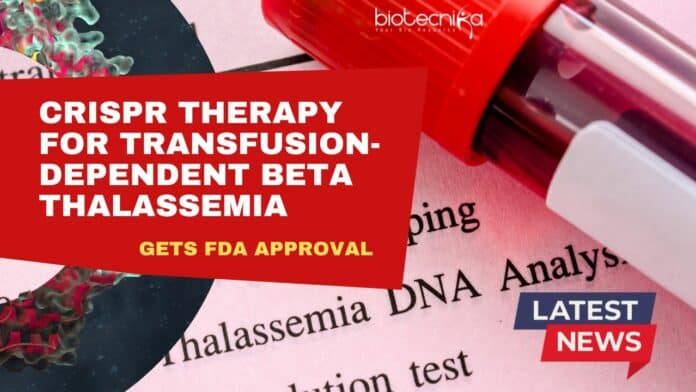CRISPR Therapy For Transfusion-Dependent Beta Thalassemia Gets FDA Approval
New CRISPR Gene-Editing Treatment: A Revolutionary Breakthrough in Medical Technology
The Food and Drug Administration (FDA) has given its stamp of approval to Casgevy, a breakthrough therapy developed by Vertex Pharmaceuticals and CRISPR Therapeutics. This therapy utilizes CRISPR gene-editing technology to treat transfusion-dependent beta thalassemia, a serious blood disorder. This is the second major approval for CRISPR-based treatments in the United States, following the approval for sickle cell disease treatment just a month ago.
Understanding Transfusion-Dependent Beta Thalassemia
Transfusion-dependent beta thalassemia is a genetic disorder that affects the production of hemoglobin in the blood. Patients suffering from this condition require regular blood transfusions for treatment. Casgevy aims to address this disorder by utilizing the innovative CRISPR gene-editing technology to modify patients’ blood cells. These modified cells are then transplanted back into the bone marrow, prompting an increase in hemoglobin production. The FDA has highlighted some common side effects of this treatment, including mouth sores, fever, and decreased appetite.
The Significance of FDA Approval
The FDA’s approval of Casgevy marks a significant milestone in the field of gene-editing technology. It demonstrates the growing acceptance and recognition of CRISPR-based therapies as a viable
option for treating genetic disorders. The swift approval of two such treatments in such a short duration is a testament to the potential and promising future that CRISPR technology holds in the medical field.The Impact on Patients
This groundbreaking approval paves the way for patients suffering from transfusion-dependent beta thalassemia to benefit from this cutting-edge treatment. The therapy has shown tremendous potential in improving the quality of life for patients by reducing their dependence on regular blood transfusions. Vertex Pharmaceuticals and CRISPR Therapeutics are working together to establish a network of treatment centers across the United States to administer Casgevy. Currently, there are nine activated treatment centers, with more expected to be activated in the near future.
The Future of CRISPR Technology
CRISPR, an acronym for “clustered regularly interspaced short palindromic repeats,” is revolutionizing the medical field. It allows for precise and accurate changes to be made to DNA, offering new possibilities for treating various disorders. In 2020, Emmanuelle Charpentier and Jennifer Doudna were awarded the Nobel Prize for their discovery of the CRISPR tool – a testament to its transformative impact on molecular life sciences, plant breeding, and potential in curing inherited diseases.
The Market Reaction
The approval of Casgevy has had a significant impact on CRISPR Therapeutics’ stock market performance. The company saw a rise of over 50% in stock value last year following regulatory advancements in CRISPR technology. This demonstrates the investor confidence in the potential of this revolutionary technology to transform the medical landscape.
The FDA’s approval of Casgevy for the treatment of transfusion-dependent beta thalassemia marks a significant milestone in the field of gene-editing technology. This breakthrough therapy showcases the potential of CRISPR to revolutionize medical treatments and improve the lives of patients suffering from genetic disorders. With more treatment centers set to administer Casgevy, patients can look forward to a brighter future with reduced reliance on regular blood transfusions.
Keywords: FDA approval, CRISPR gene editing, Casgevy therapy, transfusion-dependent beta thalassemia, gene-editing technology, medical breakthrough, precision medicine, stock market performance






























